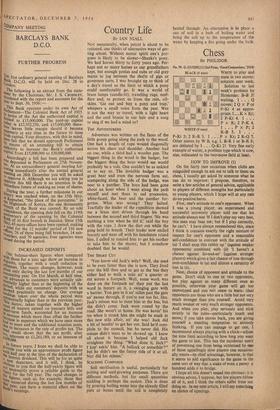Chess
By PHILIDOR No. 79. G. GUIDELLI (2nd Prise, 'Good Companions.' 1916) BLACK (8 men)
WRITE (9 men)
WHITE to play and mate in two moves: solution next week.
Solution to last week's problem by Shinkman: B-B 3!
waiting. 1 . . Q moves; 2 Q x P or P-Kt 4 as appro- priate.) ...K x Kt;
2 P-Kt 4. 1 . . P x R; 2 P-K 4.
1 . . P x P; 2 R-B 5. 1 . . . P—Kt 5; 2 R-R 5. 1 . . . P x Kt; 2 R-Q 7. Other moves by W B, e.g. 1. B-R 1 or B-R 8; are defeated by 1 . . . Q-Kt 2! Very fine early example of waiter, a problem type which is now, alas, exhausted in the two-move field at least.
HOW TO IMPROVE (1)
On the fairly rare occasions when clubs are misguided enough to ask me to talk to them on chess, I usually get asked by someone what he can do to improve: I propose, therefore, to write a few articles of general advice, applicable to players of different strengths but particularly to young players, which I hope will at any rate do no positive harm.
First, one's attitude to one's opponent. When I was a young player, an experienced and successful university player told me that his attitude always was 'If I don't play my very best, this man may beat me; but if I play correctly, he can't.' I have always remembered this, since I think it contains exactly the right mixture of respect for one's opponent and a reasonable self-confidence in contrast with the attitude of (a) 'I shall mop this rabbit up' (against weaker opponents) combined with (b) 'I haven't a chance against So-and-so' (against stronger players) which gives a fair chance of loss through over-confidence in (a) and almost a certainty of loss in (b).
Next, choice of opponent and attitude to the game. Don't stick to one or two opponents, but play against as many different ones as possible, otherwise your game will get too stereotyped and you will cease to learn: ideal opponents are those who are a little but not very much stronger than you yourself. Avoid very much weaker or very much stronger Opponents. And when you play, play seriously and stick strictly to the rules—particularly touch and move; if you take moves back, you are giving yourself a standing temptation to slovenly thinking. If you can manage to get one, I recommend always playing with a clock—adjust the time limit according to how long you want the game to last. This has the incidental merit of preventing one from being victimised by one of those appallingly slow players one occasion- ally meets—its chief advantage, however, is that it seems to add significance to the game in the same sort of way that a stake of even a penny a hundred adds it to bridge.
I hope all this doesn't sound too obvious; it is obvious advice, 1 suppose, but few players follow all of it, and 1 think the others suffer from not doing so. In my next article, 1 will say something on choice of openings.


































 Previous page
Previous page